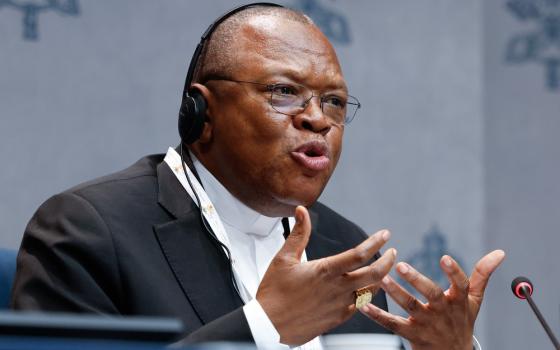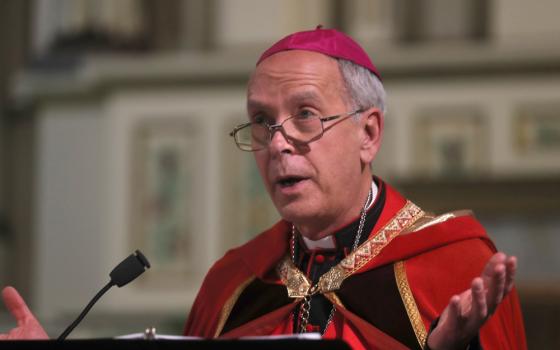
Nazareth, Israel
Pope Benedict XVI continued riding what one might call his metaphorical "peace train" in the Middle East today, calling upon followers of different faiths to build bridges and reject hatred – which, the pope said, "kills men's souls before it kills bodies."
Summing up Benedict's message on his week-long trip, Vatican spokesperson Fr. Federico Lombardi today used three words: "Peace, peace, peace."
Very much in that spirit, this afternoon brought arguably the best visual of the trip. At the close of an inter-faith meeting in Nazareth involving Christians, Jews, Muslims, and Druze, the pope and leaders of each community stood on stage and held hands while belting out a song specially composed for the occasion: "Salam, Shalom, Lord Grant Us Peace."
Standing in the center of the stage, Benedict held hands with a rabbi and a Druze sheikh.
This was the pontiff's lone day in Nazareth, described in the New Testament as the hometown of Jesus and his parents, Mary and Joseph. It's located in northern Israel in the Galilee, roughly 70 miles from Jerusalem.
The pope celebrated an open-air Mass for roughly 40,000 at the "Mount of the Precipice," which tradition regards as the setting of a Biblical scene in which a mob pursued Jesus to the edge of a cliff.
The pope also visited the grotto in Nazareth where an angel is believed to have appeared to Mary to announce that she was pregnant with Jesus. He took part in an inter-faith session and then celebrated a vespers service in the Basilica of the Annunciation.
Though the day was largely spiritual in tone, it did include one political note: a private meeting with Israeli Prime Minister Benjamin Netanyahu. This week, Benedict has repeatedly affirmed his support for a two-state solution to the Israeli/Palestinian conflict, while the new Netanyahu government has sent ambivalent signals about its commitment to Palestinian statehood. The meeting took place behind closed doors, and a Vatican spokesperson said afterwards only that the two men had discussed the peace process.
Throughout the day, the pope's message boiled down to a pitch for peace.
During Mass, the pontiff averted to Christian-Muslim tensions in Nazareth. Local Muslims want to build a mosque near the Basilica of the Annunciation, on a spot which they believe marks the grave of Shahib al-Di, a nephew of Saladin, the Muslim commander who defeated the Crusaders in 1187. Protests from Christians, both in Nazareth and around the world, including the U.S. bishops, prompted the Israeli government to halt plans for the mosque in 2002 – a decision that embittered many Muslims.
"Sadly, as the world knows, Nazareth has experienced tensions in recent years which have harmed relations between its Christian and Muslim communities," Benedict said.
"I urge people of good will in both communities to repair the damage that has been done, and in fidelity to our common belief in one God, the Father of the human family, to work to build bridges and find the way to a peaceful coexistence."
"Let everyone reject the destructive power of hatred and prejudice, which kills men's souls before it kills their bodies!" the pope said.
Prior to the pope's visit, a Muslim group called Ansar Allah, or "Army of God," erected a banner several days ago at the mosque near the Basilica of the Annunciation, which contains an indirect warning to the pope: "Muhammad is God's messenger who are with him are fierce against infidels." The banner, however, was not visible from the courtyard of the basilica where this afternoon's events took place.
In his session with religious leaders, the pope continued the peace theme.
"Our different religious traditions have a powerful potential to promote a culture of peace, especially through teaching and preaching the deeper spiritual values of our common humanity," he said.
"Christians readily join Jews, Muslims, Druze, and people of other religions in wishing to safeguard children from fanaticism and violence while preparing them to be builders of a better world," the pope said.
The peace song that ended the meeting was composed by Alon Goshen-Gottstein, a Jew who runs an inter-faith center in Jerusalem.
Goshen-Gottstein said he wrote the song only in the last few days, after an ecumenical event in Jerusalem on Monday when an anti-Israeli speech from a Muslim sheikh cast a pall over the event. Working through local contacts, Goshen-Gottstein said he proposed to the Vatican that the song should be performed at today's event, including the moment when the religious leaders rose and held hands.
"I was tormented and anguished that this opportunity was being wasted," he said immediately after the event. "I told them, you need a visual. There should be a picture to correct what went wrong."
In Nazareth, Benedict also called for unity among Christians. There are thirteen different Christian denominations in the Holy Land, and their relations are notoriously fractious. Unity, the pope argued, will allow them to promote "genuine reconciliation between the different peoples who recognize Abraham as their father in faith."
Because Nazareth is the home of the Holy Family, the pontiff also touched on family life. He underscored "the sacredness of the family, which in God's plan is based on the lifelong fidelity of a man and a woman consecrated by the marriage covenant and accepting of God's gift of new life."
Benedict XVI wraps up his weeklong visit to the Middle East tomorrow. He will take part in an ecumenical meeting with the Greek Orthodox Patriarch of Jerusalem, as well as visits to the Holy Sepulchre and the Armenian Patriarchal Church of St. James, before returning to Rome in the afternoon.
Deliberately, Benedict plans on departing before the Jewish Sabbath begins. There will thus be no repeat of what happened during John Paul's 2000 visit, when his meeting with Barak took place on a Friday. Barak was forced to cut the encounter short, since no Israeli politician can afford to be seen violating the Sabbath. An open microphone caught Barak confiding to the pontiff, "We have to go now … We have to keep our government together!"
For his part, Nazareth Mayor Ramiz Jaraisy proclaimed himself "very satisfied" with the day. During a midday press conference, Jaraisy, a Greek Orthodox Christian, said that city officials had only two months to prepare for the event that would draw the largest crowd on the pope's entire itinerary, because competition over which site would host the pontiff delayed a decision until the last minute.
"Fortunately, the right decision was made," Jaraisy said. "After all, he's called 'Jesus of Nazareth,' not any other place."
-------------------------------------------------------------
John L. Allen Jr. is NCR senior correspondent. His traveling with Pope Benedict XVI in Jordan, Israel and the Palestinian Territories May 8-15. Read NCRonline.org daily for his dispatches from the Holy Land.
The stories he has filed so far:
Church in Israel struggles to find its Hebrew voice (May 14)
Today, Benedict belonged to the Palestinians (May 13)
Pope strikes new balance in the Old City (May 12)
The pope and the Hitler Youth, in Benedict's own words (May 12)
Analysis: Benedict's timeless touch noble, but tricky (May 12)
At Yad Vashem, what pope doesn't say makes waves (May 11)
Pope in Israel mends fences, but doesn't pull punches (May 11)
Pope calls on Mideast Christians to perservere (May 10)
Benedict XVI sets new papal record for mosque visits (May 9)
Even in Jordan, Christian-Muslim ties not always easy (May 9)
Emphasis on Islam makes pope's trip an original (May 8)
Five challenges await pope on Middle East swing (May 7)
Pope's Holy Land pilgrimage a huge roll of the dice (May 7)


